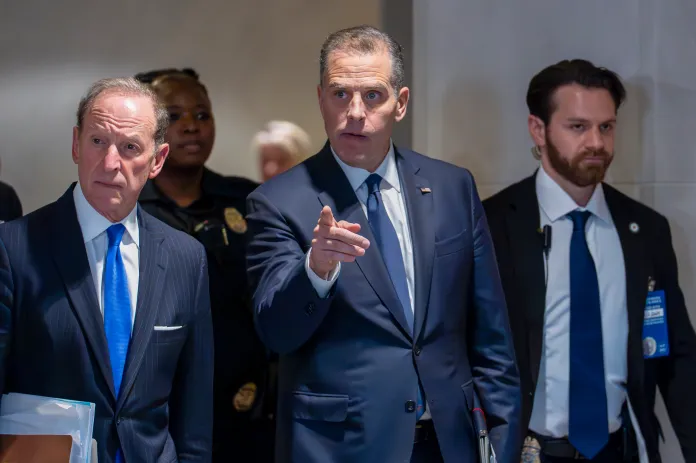Hunter Biden Reluctantly Pleads Guilty To Avoid Messy Trial
On Thursday, Hunter Biden was scheduled to face trial for tax crimes in Los Angeles but sought to change his plea to an Alford plea, which would allow him to maintain his innocence while admitting legal guilt. This request emerged just before jury selection began, leading to a debate in court about whether the judge must accept the Alford plea, given that the prosecution strongly opposed it. An Alford plea, established by the Supreme Court in the 1970 case *North Carolina v. Alford*, permits a defendant to plead guilty without admitting guilt if they believe that a trial could lead to a conviction due to strong evidence against them.
The prosecution argued that accepting an Alford plea would be unjust. However, under federal law, the acceptance of such a plea is ultimately at the judge’s discretion, not dependent on prosecution agreement. During discussions, the judge expressed uncertainty about the necessity of a factual basis supporting the plea but acknowledged that he could potentially accept it if sufficient evidence was provided. This led to confusion as to the requirements for an Alford plea versus a standard guilty plea.
after a recess for further discussions, the case was resolved with Biden changing his plea to a regular guilty plea, sidestepping the complexities and potential controversies surrounding the Alford plea.
On Thursday, Hunter Biden was set to stand trial for tax crimes in federal court in Los Angeles, California, in a case brought by Special Counsel David Wise. The proceedings were quickly derailed just before jury selection began, however, when defense lawyer Abbe Lowell advised Judge Mark C. Scarsi that Biden wished to change his plea from “not guilty” to an “Alford plea” and thereby avoid a trial altogether.
An Alford plea is one in which the defendant maintains his innocence but agrees to plead guilty anyway and accept punishment just as if he had been found guilty by a judge or jury. The constitutionality of such a plea was confirmed by the Supreme Court in the case of North Carolina v. Alford, 400 U.S. 25 (1970), hence the name “Alford plea.” In an Alford plea, the defendant does not admit that he is guilty, but he accepts legal guilt for the charged offenses and submits to being sentenced for them.
The Supreme Court explained that, “while most pleas of guilty consist of both a waiver of trial and an express admission of guilt, the latter element is not a constitutional requisite to the imposition of criminal penalty. An individual accused of crime may voluntarily, knowingly, and understandingly consent to the imposition of a prison sentence even if he is unwilling or unable to admit his participation in the acts constituting the crime.” Pointing out that sometimes simply not going to trial could benefit a defendant, the Court concluded that even pleas coupled with some assertion of innocence or of lesser culpability can still be constitutional, where “a defendant intelligently concludes that his interests require entry of a guilty plea and the record before the judge contains strong evidence of actual guilt.”
As the Supreme Court’s observations imply, Alford pleas can be highly useful in resolving certain criminal cases without expending the resources involved in a trial. Principally those would be cases in which the defendant does not personally believe himself to be guilty, but the evidence is sufficiently strong that a jury is likely to convict anyway. While an Alford plea is a useful device for conserving the resources of the judicial system — and the time of victims and witnesses who would have to testify at trial — prosecutors and courts often disfavor Alford pleas because they are perceived as more likely to result in defendants trying to undo their convictions later on, claiming innocence all along. There are numerous procedural safeguards to prevent that result, but prosecutors and judges minimize the use of Alford pleas anyway to further prevent it.
Alford Pleas in Federal Court
Federal criminal procedure permits a defendant to enter one of three types of pleas: not guilty, guilty, or nolo contendere. The federal courts treat an Alford plea (which arose in the context of a state court prosecution) as a plea of nolo contendere under federal Rule 11.
In the Hunter Biden case, during the argument before the judge that followed Lowell’s bombshell announcement of a prospective Alford plea, the lawyers debated with Judge Scarsi whether he was required to accept an Alford plea or had discretion to reject it. Lowell argued that the judge had to accept the Alford plea. The prosecution vigorously opposed any Alford plea. Assistant Special Counsel Leo Wise said the prosecution would “not under any circumstances agree to an Alford plea. We think it’s an injustice.” He urged Judge Scarsi to reject the offer of an Alford plea and proceed to trial.
Department of Justice policy rules strongly discourage the use of Alford pleas and require supervisory approval before a plea agreement can be based on an Alford plea. This is likely why Wise said the prosecution would not agree to an Alford plea “under any circumstances.” However, Biden’s attorney was not proposing any plea agreement with the government. Instead, he was proposing to plead guilty to the indictment via an Alford plea. The DOJ’s approval policy is irrelevant in such circumstances. Instead, it is the court that has the power to accept or reject an Alford plea.
Indeed, the Supreme Court noted in the Alford decision that the decision whether to permit such a plea is up to the court:
Our holding does not mean that a trial judge must accept every constitutionally valid guilty plea merely because a defendant wishes so to plead. A criminal defendant does not have an absolute right under the Constitution to have his guilty plea accepted by the court, see Lynch v. Overholser, 369 U.S. at 369 U. S. 719 (by implication), although the States may by statute or otherwise confer such a right. Likewise, the States may bar their courts from accepting guilty pleas from any defendants who assert their innocence.
Likewise, Rule 11(a)(1) of the Federal Rules of Federal Criminal Procedure provides that a nolo contendere plea requires the court’s consent; not the prosecutor’s. The drafters of this rule explained that it “is intended to make clear that a judge may reject a plea of nolo contendere and require the defendant either to plead not guilty or to plead guilty under circumstances in which the judge is able to determine that the defendant is in fact guilty of the crime to which he is pleading guilty.”
To guide the court’s decision making as to whether to accept a nolo contendere plea, Rule 11(a)(3) further states: “Before accepting a plea of nolo contendere, the court must consider the parties’ views and the public interest in the effective administration of justice.” This part of the Rule was added by the Supreme Court itself in 1975.
Thus, in Hunter’s case, the prosecutor overstated the role of his office in the process, trying to wrest power from the court by asserting that the government would not “agree” to the Alford plea when in reality it is not up to the government to agree or not. The prosecution can have a “view” as the rule calls it, but it does not have a determining vote. Conversely, the defense counsel tried to force the court to accept an Alford plea when in fact all of the law on this point reposes discretion in the judge, not a mandatory obligation. Alford pleas make up a tiny fraction of pleas in all courts nationwide, and are extremely rare in federal court, so perhaps it’s not surprising that the lawyers were not completely conversant with the niceties of federal law concerning them.
For his part, the judge stated that he knew of no case that required him to accept an Alford plea, but he was not inclined to reject it out of hand either. He suggested that the case be recessed, and the parties submit briefs on the legal question, which he would decide on the following morning. At that point, Hunter’s counsel instead requested a short recess for the parties to talk outside the courtroom.
Factual Basis for an Alford Plea
In the midst of discussing whether an Alford plea could proceed at all, the prosecutor and judge also commented on the issue of whether a factual basis would be needed to support an Alford plea, with the judge opining that he could potentially accept an Alford plea if he were proffered a sufficient basis of factual evidence to support guilt.
The prosecution had labeled an Alford plea in Biden’s case an “injustice,” evidently because such a plea would mean Biden did not personally admit guilt and because the prosecution’s evidence of guilt would not be presented in court, as no trial would take place. The prosecutor therefore announced: “If we go forward today, we will read the entire indictment into the record as being the evidence we would prove at trial.”
That assertion constitutes an extremely lame threat, given that the indictment is already fully part of the record. What is ordinarily done in federal guilty plea proceedings is that the defense and the prosecutors have worked out an agreed set of facts supporting the guilty plea. When there is no agreement as to the facts, the government must provide to the court sufficient facts to support the plea, and this is usually done by the prosecutor drawing out the most salient facts from the indictment and summarizing the case for the judge, with the defense lodging no objections. In theory the prosecution can offer a factual basis to the court with any facts known to it via proffer or perhaps a short bit of testimony from the case agent whether in the indictment or not.
The discussion on this point between the lawyers and the judge, however, omitted the distinction that while a guilty plea requires a factual basis before the court may accept it, a nolo contendere plea does not. That too is left to the discretion of the court. Rule 11(b)(3) addresses this point and applies only to guilty pleas. It says: “Determining the Factual Basis for a Plea. Before entering judgment on a guilty plea, the court must determine that there is a factual basis for the plea.”
It is not an oversight that nolo contendere pleas were not included in the section of the rule requiring a factual basis. To the contrary, nolo contendere pleas were specifically excluded. The Rules Committee in 1966 explained this, saying: “For a variety of reasons it is desirable in some cases to permit entry of judgment upon a plea of nolo contendere without inquiry into the factual basis for the plea. The new third sentence is not, therefore, made applicable to pleas of nolo contendere.” Essentially, if a defendant is simply electing “not to fight” the charges, then the charges alone can suffice in many instances to support that decision.
Thus, Judge Scarsi would have been well within his powers to accept (or reject) an Alford plea from Biden, with or without a factual basis beyond the facts already laid out in the indictment filed in the case.
Case Ultimately Resolves on a Standard Guilty Plea
After all the drama caused by Lowell’s surfacing of an Alford plea and the prosecution’s consternation, the ultimate resolution of the case was pretty standard. Upon taking up Lowell’s suggestion for a brief recess, the court released the parties. They returned to the courtroom a while later having worked out an agreement for Biden to plead guilty — not nolo contendere — to all the charges in the indictment, with the prosecutor reading the indictment (again) into the record as the factual basis for the guilty plea. The court accepted the guilty plea and released Biden to return for a sentencing date to be set at a later time.
The defense probably expected from the start that this is how the day would turn out. It could have proposed simply to plead to the indictment. Neither the prosecutor nor the judge could have really raised objections or concerns about that, as they did with the proposal of an Alford plea. Hunter Biden would be just as legally guilty, would be getting the same sentence, and likely the prosecutor would have just read the indictment into the record as he ended up doing because the parties did not have a prepared statement of facts. The only thing that would have been different is that Hunter Biden would not have actually and personally admitted guilt. The defense swung for that fence and fell short. But the end result isn’t really all that different. Hunter Biden didn’t want to go to trial; so, he didn’t.
Leslie McAdoo Gordon is the principal of McAdoo Gordon & Associates, P.C., founded in 2003. She provides criminal defense for individuals facing misdemeanor and/or felony charges, as well as “white collar” criminal offenses in state and federal courts. She also represents contractors and individuals facing administrative sanctions, including revocation of security clearances and debarment from federal contracts. Ms. McAdoo Gordon graduated cum laude from the Georgetown University Law Center in 1996. She is licensed to practice law in Maryland, Virginia, the District of Columbia, and numerous federal trial and appellate courts, including the U.S. Supreme Court.
" Conservative News Daily does not always share or support the views and opinions expressed here; they are just those of the writer."




